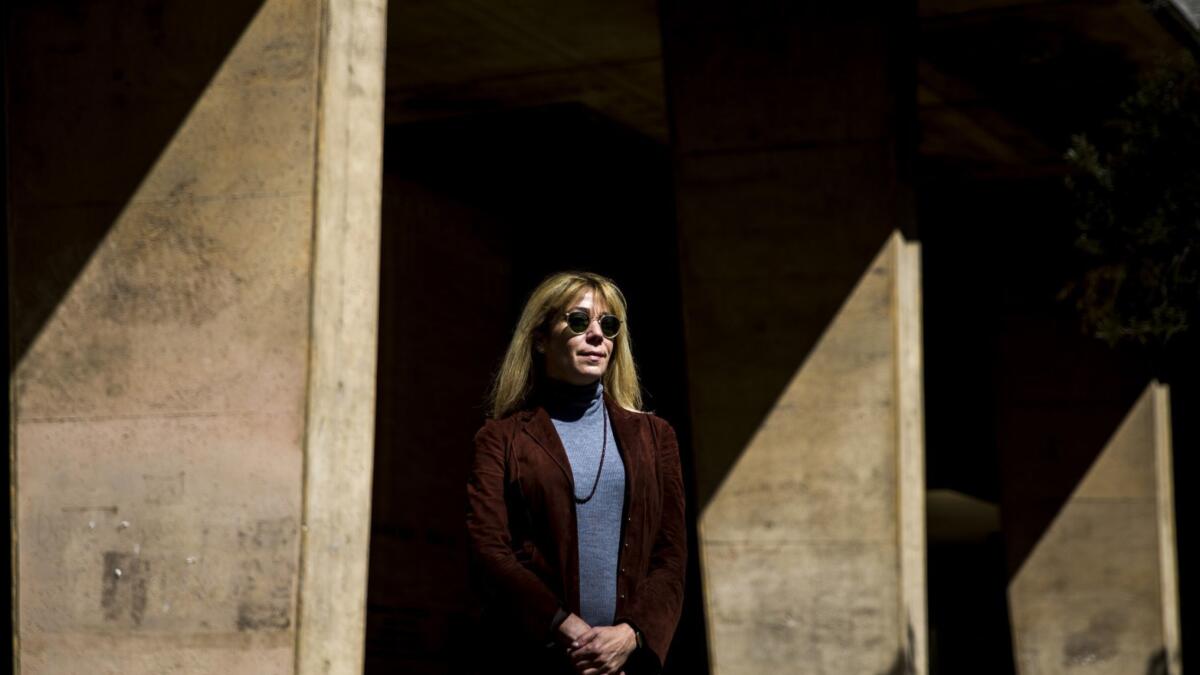UCLA student wins sexual misconduct claim against professor

UCLA graduate student Kristen Glasgow says she first met Gabriel Piterberg, a history professor, in 2008. They had coffee together and then, she alleged, he walked her to her car, pushed her against it and forced his tongue into her mouth.
Glasgow detailed this and other claims of Piterberg’s sexual misconduct over a five-year period in a lawsuit she filed against the University of California in 2015.
The lawsuit said that UCLA essentially ignored her complaints when she tried to go through the Title IX complaint process. It led to a settlement in which the UC gave her $110,000 and a fellowship to support her work on her doctoral dissertation.
But even after that validation, UCLA’s initial response to her charges still gnawed at Glasgow — as did the fact that Piterberg still had his job. When UCLA hired a new Title IX coordinator, Glasgow filed a complaint again, in 2016. This time, she won.
UCLA announced last week that a Title IX investigation had determined that Piterberg had violated the university’s sexual harassment policy. Piterberg, who disputes the findings, did not respond to requests for comment.
He has agreed to leave UCLA and forgo any future employment with the UC system, emeritus status, office space or other privileges.
UCLA did not identify the person who filed the complaint against Piterberg, but Glasgow contacted The Times to share her story.
“This is a huge victory for female academics and women in general,” she said. “It just really shows that you can’t be protected behind institutions anymore under the veil of tenure or powerhouse rock star or movie mogul. People are going to start calling you out on it.”
Glasgow, a specialist in 19th century African American and transatlantic history, praised UCLA’s handling of her case the second time around.
“I don’t have enough gratitude for how they handled it this time,” she said.
She said she first formally reported Piterberg’s behavior in 2013 to support another graduate student, Nefertiti Takla, who had filed her own sexual misconduct complaint against the professor that year. It wasn’t only UCLA officials who shrugged off what she had to say, she said. Ever since the trouble with Piterberg had begun years earlier, Glasgow said, colleagues had told her that she would ruin her academic career if she pursued charges against the prominent specialist in Middle East studies.
UCLA had reached a settlement with Piterberg in the Takla case in 2014, but officials did not release the details until two year later, after students and faculty escalated their protests against the professor’s continued employment. Piterberg had not conceded wrongdoing under the settlement, but he had agreed to pay a $3,000 fine, accept a suspension without pay for one quarter and attend sexual harassment training. UCLA also barred him for three years from holding closed-door, one-on-one meetings in his office and restricted open-door meetings to daytime hours.
In exchange for his abiding by those terms, UCLA agreed to end its investigation without reaching a conclusion or initiating charges against Piterberg with the Academic Senate, which could have jeopardized his tenure.
On the day Piterberg returned to teaching last year, students staged a noisy protest and put a poster up in his classroom: “Good morning sexual harasser.”
By then, UCLA had hired Kathleen Salvaty as its Title IX coordinator. Glasgow said Salvaty was empathetic, professional and fair.
The campus also launched sweeping reforms under Jerry Kang, who was appointed as its first vice chancellor of equity, diversity and inclusion in 2015. Since he took the job, UCLA has hired more staff to handle complaints, expanded training about sexual harassment, imposed reporting requirements for suspected misconduct and improved communication about the status of cases. UCLA and other UC campuses also have hired confidential advocates to support survivors of sexual misconduct, and Salvaty has moved on to become the UC’s first systemwide Title IX coordinator.
Glasgow felt it was important not to give up.
“I wanted to make an example of myself that even when you’re not heard the first time, you can be heard the second time,” she said. “I wanted to show that the Title IX path could actually work for people. I wanted to prevent this professor from ever teaching again.”
The second time around, it wasn’t only that Salvaty listened deeply and clearly explained the investigative process. Officials kept Glasgow updated on her case. They got her the support of a confidential advocate.
Last spring, Glasgow received news that she won her claim.
Last week, just over a decade after her first encounter with Piterberg, she learned that he finally had lost his job. In a statement, UCLA said that the Title IX findings had been referred to the Academic Senate, which urged the university and Piterberg to negotiate a settlement.
“I cried, I laughed, I screamed,” she said. “It was 10 years of 10,000 pounds of weight off my shoulders.”
As news of her victory spread, Glasgow said, a female graduate student texted her a picture of her 1-year-old daughter with the message: “My daughter wants to thank you.”
More to Read
Sign up for Essential California
The most important California stories and recommendations in your inbox every morning.
You may occasionally receive promotional content from the Los Angeles Times.










